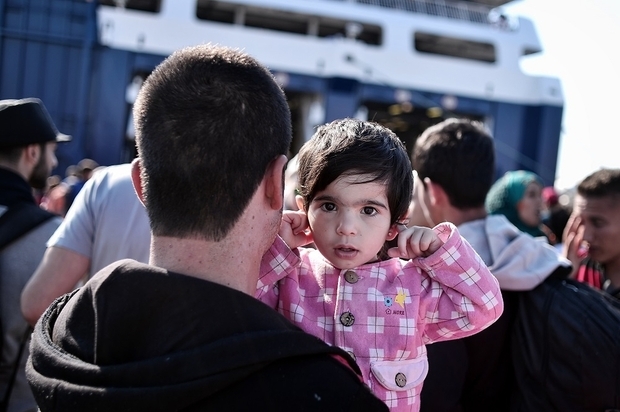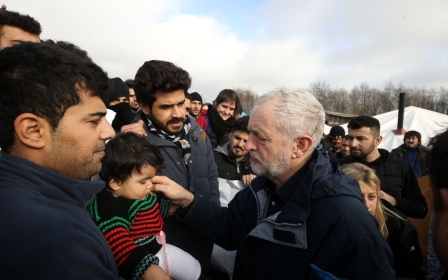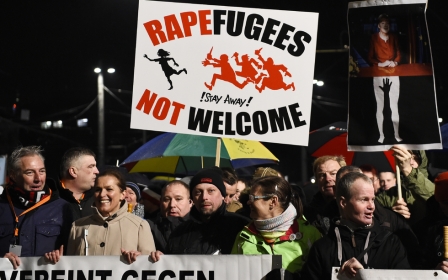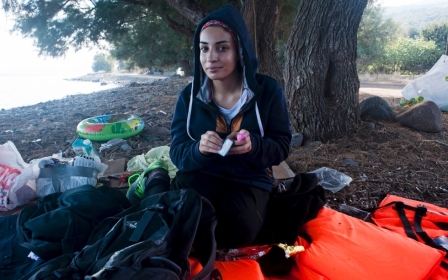Can Europe still hold on to promise of integration for refugees?

On Monday, 22-year-old Swedish refugee-centre employee, Alexandra Mezher, was stabbed to death by an unidentified asylum seeker, aged 15. Mezher worked at a centre for unaccompanied youths in Molndal, near Gothenburg, in western Sweden, serving teenage asylum seekers, including the alleged attacker.
The incident is the latest in a string of attacks that are causing many people in Europe to fear that the growing number of incoming refugees will lead to increased terrorism.
The tragic event came just weeks after a suicide bomber who entered Turkey as a Syrian refugee shook Turkey’s iconic Sultanahmet Square, killing 10 German tourists, and on the heels of a mass sexual assault in Cologne on New Year's Eve, which spurred hate crimes and anti-immigrant protests after the discovery that many of the suspects were asylum seekers.
International media coverage of the refugee crisis disproportionately amplifies the deplorable actions of a few and neglects the efforts of the majority to integrate and be integrated into European societies. While tensions run high throughout Europe, others work to help asylum-seekers adapt to their societies.
Mareike Geiling is one of three founders at Fluchtlinge Willkommen, meaning “Refugees Welcome". She and fellow co-founder Jonas Kakoschke came up with the idea for an “Airbnb for refugees” when they met a young migrant from Mali and found out he was homeless. “He and Jonas hit it off, and that same night he moved in with us,” said Geiling.
Refugees Welcome matches refugees with locals willing to house them. Geiling and her colleagues say integration is impossible while refugees are forced to live in concentrated, isolated areas where they hardly interact with local people. The services Refugees Welcome provides do not benefit refugees alone.
“For hosts, it’s the first time they meet a refugee in person, hear about their story, their background. This opens and changes a lot of minds.” Refugees housed in European homes find jobs faster, wade through bureaucratic steps with greater ease, and learn the language quickly, according to Geiling.
German Chancellor Angela Merkel has been persistent in her policy of acceptance for asylum seekers, despite protests from within the EU, Germany, and her own political party. As recently as a speech she delivered in late December 2015, Merkel stuck by her decision to allow over one million refugees into Germany, and reiterated her belief that Germany could welcome refugee populations successfully.
Yet the afternoon before the event in Istanbul, she spoke at an event in Mainz, Germany, admitting to cracks in her integration policy. "We are vulnerable, as we see, because we do not yet have the order, the control that we would like to have."
In German streets just months ago, hundreds of Germans held up welcome signs for refugees crossing the border. Now, those humanitarians have been displaced by angry crowds from a group called the Patriotic Europeans Against the Islamicisation of the West (PEGIDA). Instead of “Willkommenskultur,” new menacing signs now read, "Rapefugees".
Protests in some places against incoming refugees have translated into direct violence. Five Pakistanis and one Syrian man were violently assaulted on 10 January in Cologne by a mob of unknown assailants, sending two to the hospital. The same day, another Syrian man was attacked by a group of five men.
German feminist activism group #ausnahmslos (#noexcuses in English), says that some people in Germany are intentionally trying to divide refugees and their host populations, using recent events in Cologne to spread a fear of migrants as a threat to European women specifically.
In a set of published demands, group leaders claim that “it is harmful for all of us if feminism is exploited by extremists to incite against certain ethnicities … the perceived "others": Muslim, Arab, black, or North African men.” The group emphasises the importance of protecting the rights of migrant women as well, stating as part of its demands that sexual-based violence “not only be taken seriously if white women are the alleged victims".
The reaction to incidents in Cologne added fuel to the fire already beginning to rage among anti-immigration groups, political and otherwise, across Europe.
In November, Sweden declared a reversal of their once-lauded open-door refugee policy. Support for the anti-immigrant Swedish Democrat party, whose early history is intertwined with the Neo-Nazi movement, has risen to 19 percent today from 12.5 percent in the September 2014 elections. A group of young men in northern Finland, calling themselves the "Soldiers of Odin," carry posters that warn “migrants not welcome,” and are the self-proclaimed safeguards of the “Islamist intruders” on behalf of overrun police forces.
The group has proliferated to other Finnish towns in recent months.
Despite the rise of anti-immigrant sentiments, many refugees are still able to become successful members of European communities. “Our roommate from Mali found a job, and he has an apartment of his own now,” said Geiling with pride, “but he is still a really important person to us, and a very close friend. It’s stories like his that keep us going and believing in our work.”
Citing the need for better support to help newly arrived refugees adapt, programmes are popping up throughout Europe where governments are failing. Refugees Welcome, which began in Germany, has expanded to nine countries, with Poland as its second-most active location.
Norway’s immigration department hired nonprofit organisation Alternative to Violence to administer mandated classes for refugees in sexual education and understanding violence. The programme has been successful in helping incoming refugees grasp new cultural realities, and now Denmark is considering its own version.
“Language is the key to everything,” says Fadi Kurdi, an English literature major who left Syria in 2012 and stayed in Turkey for a time before embarking on a harrowing journey to Holland by sea, train and foot.
Fadi has successfully relied on his English thus far in Holland, but has Syrian friends who are suffering without English language skills or in countries where English is not widely spoken. He sees learning the local language as a way of respecting his new community and adapting. “We aren’t in the Middle East anymore, that’s just no longer our reality.”
After the passing away of his sister last year, Kurdi has dreams for a fresh start in Holland. “I just want a place that is mine, a place where I can have privacy and be independent. I want to begin my life and enjoy my life.”
Integration initiatives that involve the local population as much as possible work toward solutions that are forward-thinking and allow for personal growth on all sides.
Instead of allowing fear of a small minority to imbue perceptions of refugee communities as a whole, Europe should magnify and replicate existing, effective initiatives to help refugees and migrants adapt to new surroundings. Failing to do so could cause Europe to default on its own moral values.
After each incident of violence, eyes turn to Europe for a reaction to these events. Like those citizen-led programmes in Europe, let's hope the reactions will hinder future bloodshed and not pave the way for it.
- Molly Bernstein is a journalist and a fellow with the Fuller Project for International Reporting, a media organisation based in Istanbul. She is a former Fellow at the Center for Arabic Study Abroad (CASA).
- Xanthe Ackerman is a journalist with the Fuller Project for International Reporting. Dr. Ackerman has been a scholar at the United States Institute of Peace and at Brookings' Centre for Education, and she is a member of the Council on Foreign Relations.
The views expressed in this article belong to the authors and do not necessarily reflect the editorial policy of Middle East Eye.
Photo: Migrants have made their way to Europe in record numbers in recent months (AFP)
New MEE newsletter: Jerusalem Dispatch
Sign up to get the latest insights and analysis on Israel-Palestine, alongside Turkey Unpacked and other MEE newsletters
Middle East Eye delivers independent and unrivalled coverage and analysis of the Middle East, North Africa and beyond. To learn more about republishing this content and the associated fees, please fill out this form. More about MEE can be found here.




